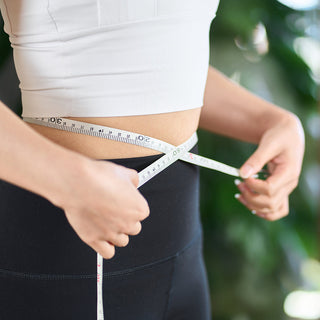
Weight Loss
Moody Weight Gain
How Our Mood can Impact Our Weight.
Our mood impacts how we fuel our body; if we feel stressed, low or generally meh, the likelihood is we will reach for the food and drink that brings us “joy.” However, this joy is often momentary and it’s served with a side of guilt, self loathing and shame. We justify our diet decisions because life is stressful, we’re time poor, our kids are bonkers and unruly, our hormones are on a rampage, we haven’t slept in a decade, everyone is inept or because it’s Monday.
We often eat and drink to cope with our emotions and not because we’re hungry, which just highlights the importance of tapping into our brain - body connection.
If we don’t, the cycle of misery will continue to roll, we will continue to self deprecate and we will normalise feeling rubbish. “It’s just life,” we will say. “I’ll do better tomorrow,” you will promise, but tomorrow never seems to come.
Having the realisation that you don’t have to feel like your worst self forever is magic. It’s the epiphany that you deserve and one that you are the master of. You are in charge!
We have been hardwired to believe that in order to feel good, we need to deprive ourselves of the things we love, workout like maniacs, only consume low fat substitutes and basically submit ourselves to relentless calorie counting. No thanks! It’s time to make friends with your body and decide to look after it properly, equip yourself with the knowledge to do that and hang up the shame and judgement you throw at it. When you treat your body with respect, marvel in everything it has done and continues to do, your brain will give you good feedback, resulting in motivation, a completely new outlook and better mood.
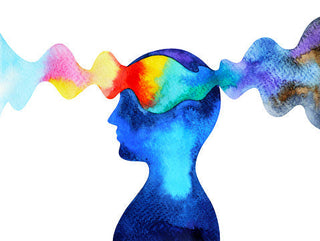

It Begins with the Brain...
Your body is not the enemy and it doesn’t take a rocket scientist to know that when you're feeding it with ultra processed and the wrong foods, over indulging on booze and not getting enough sleep, you’re going to get stuck in a cycle of harm. You might have a word with yourself eventually, opting to omit some of the deeply ingrained harmful habits, but as soon as you start to feel better, you will likely get back on the train to Hedonism. You end up feeling furious with your body and like it’s constantly letting you down, resulting in low mood.
If you Bite it, Write it!
Pay attention to what is going on inside your head and tap into some immediate ways to turn that frown upside down:
Decide that you are going to make friends with your body and like a good friend, start listening to what it’s telling you.
Keeping a mood diary is a great way of getting to know your friend, The Body. You only need to do this for a week, and if you haven’t built up your nutritional armour and you’re not aware of how things make you feel, you will likely give into the triggers that surround you every day. Track what you eat, how much you move and how it makes you feel. Note how you feel immediately afterwards and an hour later. If you often feel exhausted or bloated, understand and accept that this is not normal; it’s your body’s way of saying something is out of whack. Think about how you feel after sitting at your desk or on the sofa all day versus how you felt after a walk, or exercise.
Identify the story behind why you eat and drink what you do...
Do you cave into a bottle of wine every night because you deserve it after a stressful day at work, or because the kids have really done the number on you? Have you experienced trauma and opt for justified self medication? Do you starve yourself throughout the day so that you can load up on an ultra processed or fast food dinner?
Make a note of your triggers and what sees your cortisol sky rocket. When our cortisol rises, our body experiences a drop in serotonin and dopamine, which often means that we search for serotonin and dopamine joy in food and drink that we associate with comfort and happiness. We don’t consider the aftermath, but we should. How did that quick dopamine fix make you feel once it dissipates a little? Hungover? Low - flat? Peckish…again?
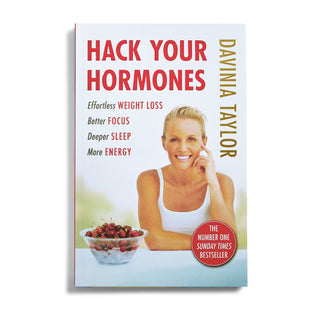

Could your change in mood be down to fluctuating hormones?
Track your cycle or symptoms of depleted or dominant hormone levels. Have a read of our review of the Hack your Hormones chapter ‘WTF is up with my cycle?’ to support your understanding of the impact hormones can have.
Mood Crashers
Are you taking any medication and does it impact your mood? Whilst there is definitely a place in the world for prescribed antidepressants, it’s important to know how they work: they level you out and stop you feeling the lows, but also the highs, which could result in Anhedonia - a condition that prevents you feeling happiness. This can result in you trying to find your joy in stuff that is going to harm and not heal. These quick dopamine hits often spike your blood sugar, leaving you searching for more of the same and perpetuating the cycle of misery.
If you understand the chemical responses in your brain, it’s easier to understand why we do the things we do and why we crave things that cause us harm. If you understand, you can pause, think and behave differently and in a healthier way which, ultimately, is going to make you feel better. By paying attention, you will train your brain to crave the stuff that makes you feel good. A mood diary is a great tool to look back on and whilst you don’t need to keep one forever, it may be the thing that stops you from reaching for the biscuit tin or bottle of merlot in the future.
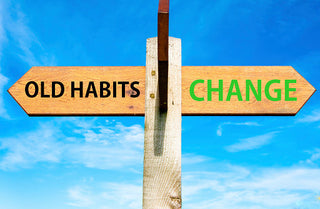

Out with the Old and in with the New Habits!
We are creatures of habit - they make us feel safe, they are easy and they require zero effort. Our brains are wired to save time and energy and we look for ways to cut corners everyday. It’s understandable, given that life is so fast paced, full of expectations and demands that we often use habits as a reward system. When you’ve managed to curate life for your family; kept everyone on time; fed; watered; clothed; entertained; happy and schooled, you justify that bottle of wine. Throw in a full day’s work; having to deal with a power-asserting boss or an annoying customer, client or colleague with grace and emotional intelligence; a dog; a house; bills and the kid’s homework…Jesus! You may think you deserve two! However, consider how it’s going to make you feel. Will you boss tomorrow in the same way, or will it feel like you're trudging through treacle? Before you know it, these little habitual rewards become ingrained and so much more difficult to change.
Take some Time
By spending 5 minutes engaging in some breathwork, having and ice bath or a super hot magnesium dip, recentering on a short walk around the block, nourishing your body with some good stuff, or bashing out a 12 minute HIIT workout, you might find that you have given yourself just enough time to park that old harmful habit. Re-frame that bad habit: don’t see it as depriving yourself - simply push it back and see how you feel. Do you have more or less energy? Do you feel better or worse? Do you feel like you need to give in to it now?
It’s so important that you don’t try and overhaul every harmful habit all at once - you will set yourself up to fail. Start with one and see how you feel. Make a note in your mood diary and then crack on with the next. You will never completely rid yourself of those cravings and instincts, but you will learn to eat one biscuit rather than 10. By treating your body with respect and giving it a moment, your brain will begin to give you good feedback, creating a new cycle of thoughts.
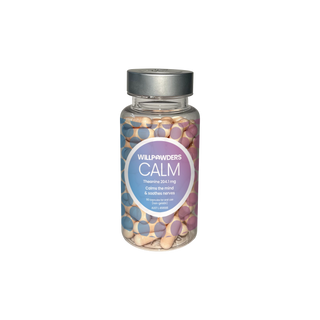

Mood Boosting Habits
- Kombucha - Swap the wine for this fizzy friend. It’s full of probiotics and antioxidants that are serotonin inducing - 95% of which is created in the gut.
- Theanine - an amino acid that generally exhibits anti-anxiety effects. It can soothe nerves and calm the mind, alongside helping you to avoid those coffee jitters as it has been shown to reduce the excitotoxicity of caffeine. It has also been linked with 'a significant effect on the general state of mental alertness or arousal' [*]
- GABA - a naturally occurring amino acid made in the brain. It improves mood, reduces anxiety and helps with PMT symptoms. One way to boost GABA is through foods rich in Vitamin B6.
- Reishi Coffee - a great mood leveller
- Magnesium Glycinate - relaxes your body and mind.
- 5-HTP - Great for panic attacks - just check with your doctor if you are on SSRI and use sporadically.
HALT and FLOW
A way to give yourself a moment is to use the HALT method, which is used in 12 step programs). Ask yourself: are you Hungry, Angry, Lonely or Tired? Rather than acting instinctively, listen to what your body is telling you. This way, you are more likely to make a good and healthy choice rather than a harmful one. Eventually, you will achieve a Flow state. This is when making good choices for your body becomes natural and second nature. It will stop being a chore, something you have to think about and it will be the choice you want to make for your body.
Depression is a disease and all disease starts in your gut. In addition, childhood trauma, or a sudden jolt of panic or fear can alter your gut microbiome and hormone balance. Think of your gut as your second brain. If your gut lacks good bacteria, your brain will be imbalanced and you will feel miserable. The saying, ‘you are what you eat’ really is true! If you feed your brain rather than what your gut is telling you it wants, those cravings will soon disappear, your immune system will work optimally, your mood will be lifted and you will become unstoppable.
Signs your gut isn’t working properly:
- Sugar cravings
- Stinky wind
- Bloating
- Tired after eating
- Brain fog after eating
- Itchy scalp or ears
- Light coloured stools
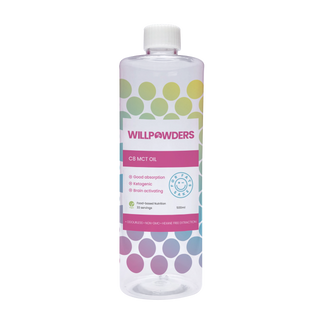

Put Carbs and Candida on your Radar!
Carbs are not the Devil but they do convert to glucose. When this happens, we experience spikes in our blood sugar. We are temporarily satisfied but very quickly become hungry again and crave more of the same. When there is too much sugar in our blood, it takes longer for energy to travel from the blood to cells in your muscles and tissues, leaving you feeling utterly exhausted and in a carb coma. Good carbs are far better consumed in the evening as they can help you induce serotonin, which is vital to aid sleep. You can read more about how you can support your sleep in our review of the Hack Your Hormones chapter ‘Why Can’t I Sleep?’
Support those carb cravings with our MCT Oil which may just give you the energy boost you are seeking.
Too many carbs can generate too much Candida in your gut...
Candida is a form of yeast that feeds on the sugar in your gut, resulting in you feeling really low, tired and sometimes mad. Candida is not something to take lightly as it can detrimentally impact your gut health, which is the key to your overall health and well-being. If you find yourself permanently bloated and craving refined sugar and white carbs, chances are your gut is infested with this harmful yeast and you need to eliminate it. To do this, you will need to engage in a re-set and avoid carbs and sugar for a while.


We have loads of tips and tricks to do this in a sustainable way in our review of the Hack your Hormones chapter ‘Why can’t I Stop Eating?’ but here are a few more:
- 2 teaspoons of L-glutamine powder, under the tongue and chased down with a fatty coffee with Stevia and cinnamon. Give it 2 minutes and see if you need to follow up on that craving,
- If you are craving bread, make yourself a boiled egg, chop it up, mix it in butter and add a sprinkling of Maldon salt.
- Replace the carbs and sugar with good fats. Make yourself a fatty coffee with our MCT Powder or Oil.
- Replace your sugar fix with a couple of drops of Stevia
- Conduct a Liver Flush over the course of a day and follow it up with our Rise and Shine for the following 6 days. Do this three times a month, feel your gut repair and watch your mood sore.
- Help your gut with fermented foods like kefir, kombucha, sauerkraut, miso and yoghurt.
- Increase your intake of veggies and salads and replace all veg oil with a good quality olive oil.
- Support those sugar cravings with Chocolate and Avocado Mousse or Paleo Chocolate Bark
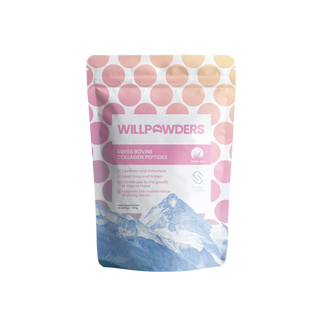

Beat the Bloat to support your Mood:
Bloating is your body’s way of telling you that something isn’t right with the old gut. It’s inflammation- your body's natural defence system.
- Drink Bovine Collagen throughout the day - 1-15g grams per serving.
- Drink or cook with bone broth
- Shoot back 2 capfuls of Molkosan and 3 capfuls of aloe vera every morning.
- Take Colostrum capsules after a hefty meal.
- Add our Bovine Collagen peptides to your coffee or saucy food. You can find loads of recipes here for some amino acid richness.
- Eat Vitamin D, Vitamin A and zinc rich foods.
- Cut down on the booze - alcohol irritates your gut lining and depletes you of vitamins, minerals and nutrients.
- Get your thyroid checked. An underactive one can cause constipation/ or a lack of bile in your gut which can interfere with digestion.
- Relaxation and movement is vital for gut health - your Vagus nerve is the nerve that tells your brain that you are anxious or nervous; your brain tells your gut you feel like this which has a negative impact. The Vagus nerve is responsible for the regulation of your internal organs and impacts your heart rate, respiratory and digestion - if we don’t move everyday, the nerve becomes lazy, preventing it from firing up and connecting with your organs which will impact your gut health and mood.
- Increase Choline levels which is key for brain health and liver detoxification - eating eggs, liver or taking supplements with phosphatidylcholine is massively beneficial.
Good Mood Foods
Amino acids - there are 20 amino acids, but 9 of them have to be obtained through food. These are histidine, isoleucine, threonine, leucine, methionine, phenylalanine, tryptophan, lysine and valine. These can be found in meat, seafood, eggs and other dairy and poultry. Our Bovine Collagen or bone broth protein is an easy way to increase your amino acid intake.
Other foods include:
- Folate - cruciferous veg such as, broccoli, rocket, cauliflower will all support your serotonin production
- Iron - low iron is associated with low mood and fatigue. Include clams, grass fed beef and organic liver (pate) in your diet to give this a boost.
- Omega 3 and EPA is an essential mood booster. Salmon, mackerel, krill oil, avocado, ghee, grass fed butter are all great sources.
- Thiamine - outdoor bred pork, salmon peas and asparagus will give this a boost.
- Vitamin B6 - beef, free range chicken thighs, sweet potato, banana, pistachio nuts will help to increase confidence levels and help regulate your mood.
- Magnesium - cocoa and dark chocolate , mackerel, salmon, halibut, spinach, Swiss chard, almonds, pumpkin seeds and flax seeds will all help with your relaxation.
- Potassium - coconut water, avocado, raw and organic dairy, Atlantic fish, apricots and bananas will support mental fatigue.
- Selenium - brazil nuts, organ meats, wild fish, outdoor bred pork are all great sources and will boost your mood.
- Vitamin B12 - clams, beef liver, raw or organic full fat milk, butter, eggs, oyster, trout will increase your energy levels.
- Vitamin C - guava, kiwi fruit, strawberries, oranges, broccoli, peas will help to reduce anxiety and depression as well as taking care of your immune system.
- Zinc - oysters, crab, lobster, shiitake mushrooms, lentils will also help to reduce symptoms of depression and look after your immune system.
- Choline - organic beef liver, eggs, organic full fat dairy, broccoli and cauliflower will increases your levels and support symptoms associated with low mood
- Vitamin D - eggs, salmon, organic full fat dairy will help to combat symptoms associated with depression.
So, you have taken the first step in equipping yourself with the knowledge of how to manage low mood and weight gain as a result of it, but you may still feel a little overwhelmed and not know where to begin...
That is absolutely understandable because it’s a lot. You might benefit from starting right at the beginning with a DNA test before you take yourself on. You could learn so much about yourself because remember, everyone is different and knowledge is power! You can’t change your genes but you can navigate your ‘disease’ genes to improve your life. Whilst you might have been predisposed to the obesity or autoimmune gene, it doesn’t necessarily mean that you have to become obese or suffer from inflammation. You might discover that you're predisposed to low serotonin levels, it doesn’t mean you can’t feel happiness ever again. With the right know-how and all the information about your makeup, you will be able to make the best decisions for your body. It’s not a one shoe fits all kind of situation. There are tonnes of at home tests you can try: Omnos, Thriva and Lifecode GX to name a few.
The key to success in finding your joy is to start slow. Take one aspect of your life that is not serving you or allowing you to thrive and tweak it. If you look after your brain, your body will follow. We know that the ‘flow’ will take time, so why not start with some immediate action to balance your mood; a jump start, if you will:
Ignite your good mood chemicals by taking a cold shower - you can read all about the benefits of cold water therapy in our dedicated blog. Avoid inflammatory oils as a first step in taking care of your gut and move your body in a way that suits your lifestyle. Make a note of how you felt afterwards and just like that, your fire and hunger for more will be sparked.
Further Product Information
Take up to two capsules daily with water.
Keep out of reach of children. Adult use only. Not recommended for use by pregnant and lactating women.
Add 15ml to your coffee, tea, smoothies, soups, sauces or dressings.
If you are pregnant, breastfeeding or taking medication under medical supervision, consult a health professional before using. This food supplement should not be used as a substitute for a varied diet. *If you are new to MCT Oil, avoid possible digestive discomfort by starting with a small serving of 5ml and increase slowly over time up to 15ml.
We recommend a serving size of 4.3g for a large coffee although serving size is up to individual taste. For best results blend with a hand-held milk frother. Alternatively add to sauces, soups and baking.
Not suitable for vegans. If you are pregnant, breastfeeding or taking medication under medical supervision, consult a health professional before using. Not suitable for under 5. This product should not be used as a substitute for a varied diet. Recommend no more than 4 servings a day.
Hydrolysed Bovine Collagen Peptides
Use daily. Add to any hot or cold liquid or baked goods. Suggested daily consumption 1-15g. If you are pregnant, breastfeeding or taking medication, please consult a health practitioner. Not suitable for children under 5. Not suitable for vegetarians or vegans.
Swallow up to three capsules daily with water when needed.
Keep out of reach of children. Contains Tartrazine as a colour.
Disclaimer
Our blogs are written with love in the hope that they go some way in helping you feel like the rockstar you are, and whilst we do our due diligence, research like maniacs and fact check our stuff, we know everyone’s journey is different. They are intended to educate and empower you, not usurp medical advice. We would never advise you to stop, adjust, or modify any prescription medication without the direct supervision of your healthcare practitioner, but don’t be afraid to talk to your doctor about your new found knowledge, brought to you by the marvels of nature because they don't know everything! Blogs are always informed by Davinia but often written by a member of the team. Not all blogs reflect Davinia's experiences and sometimes provide alternative perspectives
 Collagen
Collagen
 Protein
Protein
 MCT
MCT
 Electrolytes
Electrolytes
 Vitamins & Minerals
Vitamins & Minerals
 Nootropics
Nootropics
 Accessories
Accessories
 Books
Books










